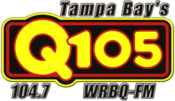WRBQ-FM
 |
|
| City | Tampa, Florida |
|---|---|
| Broadcast area | Tampa Bay Area |
| Branding | Tampa Bay's Q105 |
| Slogan | Tampa Bay's Hits of the 70's, 80's and More! |
| Frequency | 104.7 MHz (also on HD Radio) |
| First air date | June 1954 (as WPKM) |
| Format |
Classic Hits HD2: Contemporary Christian "The Faith" |
| ERP | 100,000 watts |
| HAAT | 174 meters |
| Class | C1 |
| Facility ID | 11943 |
| Callsign meaning |
Ralph Beaver (station engineer) Quality |
| Former callsigns | WPKM (1954-1972) WEZX (1972-1973) |
| Owner |
Beasley Broadcast Group (Beasley Media Group, LLC) |
| Sister stations | WPBB, WHFS, WLLD, WQYK-FM, WYUU |
| Webcast | Listen Live |
| Website | myq105.com |
WRBQ-FM (104.7 FM, "Q105") is a commercial classic hits music formatted radio station in Tampa, Florida. Owned by Beasley Broadcast Group, its studios are in St. Petersburg while its transmitter is in Palm River-Clair Mel.
Formerly beautiful music-formatted WPKM and later WEZX, 104.7 switched to a Top 40 format as WRBQ ("Q105") on December 13, 1973. The first song on "Q105" was "If You're Ready (Come Go with Me)" by The Staple Singers. Beginning in 1977, Cleveland Wheeler served as morning deejay and radio personality. The station hired Scott Shannon as program director in 1981; Shannon and Wheeler soon developed the first morning zoo radio show in the U.S. The two decided to break with tradition and work up a wilder show together, founded on their own playful, irreverent and provocative interaction, with spontaneous bits of parody and comedy leavened with straight news. They called the show the Q Morning Zoo, and it quickly became a hit. At its height, it had 85 people working to produce it. Dave Saint, Jack Harris, Bill Garcia, Uncle Johnny, Alan O’Brien, Tedd Webb, Pat McKay, and Mason Dixon were all involved with the station as on-air personalities. Q105 quickly overtook WLCY-FM, which had signed on three years earlier with an automated rock format.
According to engineer Ralph Beaver, the station's call sign was created when they were looking for a set of unique call letters and tossing out ideas, he suggested ‘RB’ (which happened to be his initials). Southern Broadcasting, which then owned the station, had just signed on WRVQ in Richmond, Virginia, and ‘RB’ was available, creating a call sign that sounded similar to its sister station.
...
Wikipedia
